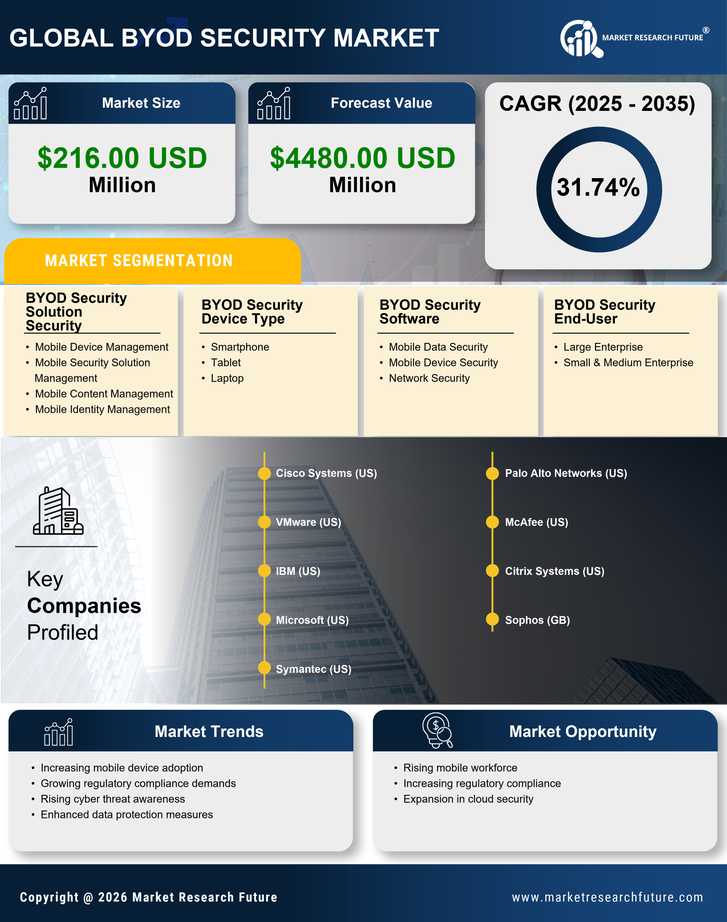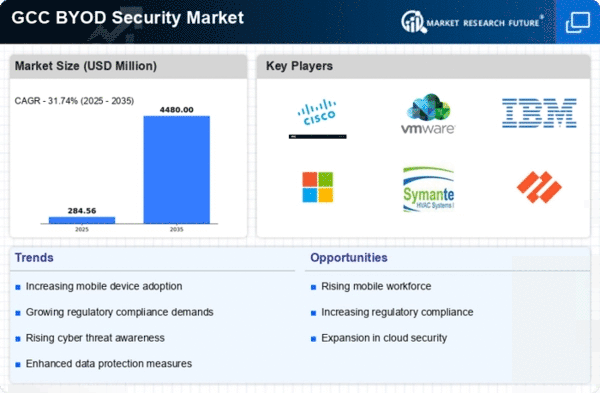Growing Mobile Workforce
The increasing prevalence of a mobile workforce in the GCC region is a primary driver for the byod security market. As organizations embrace flexible work arrangements, employees are utilizing personal devices for work-related tasks. This trend necessitates robust security measures to protect sensitive data accessed through these devices. According to recent data, approximately 60% of employees in the GCC utilize their personal devices for work purposes. Consequently, businesses are compelled to invest in comprehensive security solutions to mitigate risks associated with data breaches and unauthorized access. The BYOD security market is thus experiencing heightened demand. Organizations seek to implement policies and technologies that ensure the security of corporate information while accommodating the needs of a mobile workforce.
Increased Cybersecurity Threats
The rise in cybersecurity threats is a significant factor influencing the byod security market in the GCC. With the proliferation of cyberattacks targeting organizations, the need for enhanced security measures has become paramount. Reports indicate that cyber incidents in the region have surged by over 30% in recent years, prompting businesses to prioritize the protection of sensitive data accessed via personal devices. This heightened awareness of potential threats drives organizations to adopt advanced security solutions tailored for byod environments. As a result, the byod security market is likely to witness substantial growth as companies invest in technologies that safeguard their networks and data from evolving cyber threats.
Regulatory Frameworks and Compliance
The establishment of regulatory frameworks in the GCC shapes the BYOD security market. Governments are increasingly implementing regulations that mandate organizations to protect sensitive data, particularly in sectors such as finance and healthcare. Compliance with these regulations often requires the adoption of stringent security measures for personal devices used in the workplace. For instance, organizations may need to implement encryption, access controls, and monitoring systems to adhere to legal requirements. This regulatory landscape is driving demand for byod security solutions, as businesses seek to avoid penalties and reputational damage associated with non-compliance. The byod security market is thus positioned for growth as organizations navigate these evolving regulatory challenges.
Cultural Shift Towards Digital Transformation
The cultural shift towards digital transformation in the GCC significantly impacts the BYOD security market. As organizations embrace digital tools and platforms, the reliance on personal devices for work-related activities is increasing. This transformation necessitates a reevaluation of security protocols to ensure that sensitive information remains protected. The trend towards digitalization is evident, with a reported 70% of businesses in the region prioritizing digital initiatives. Consequently, the byod security market is likely to expand as organizations seek to implement effective security measures that align with their digital transformation strategies. This cultural shift underscores the need for comprehensive security solutions that can adapt to the evolving landscape of work.
Technological Advancements in Security Solutions
Technological advancements in security solutions are propelling the byod security market forward. Innovations such as artificial intelligence, machine learning, and advanced encryption techniques are enhancing the ability of organizations to secure personal devices. These technologies enable real-time threat detection and response, which is crucial in a landscape where cyber threats are becoming increasingly sophisticated. As organizations in the GCC recognize the importance of adopting cutting-edge security measures, the demand for advanced byod security solutions is expected to rise. The integration of these technologies not only improves security but also streamlines the management of personal devices within corporate networks, further driving growth in the byod security market.

















